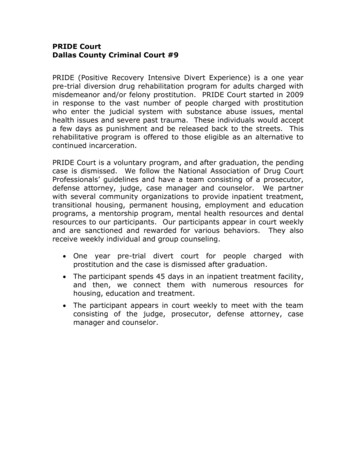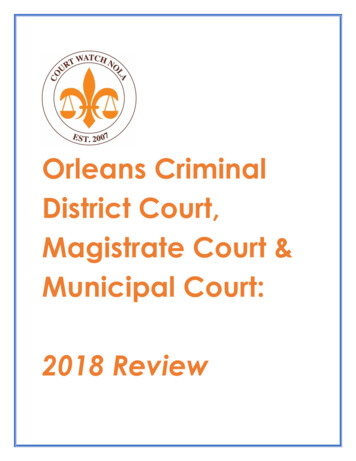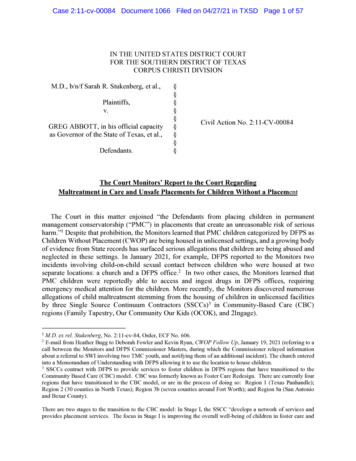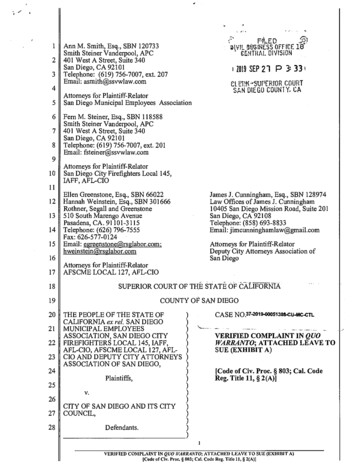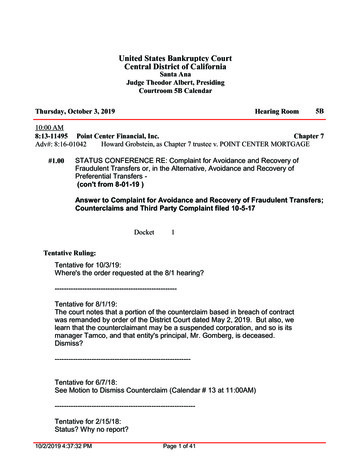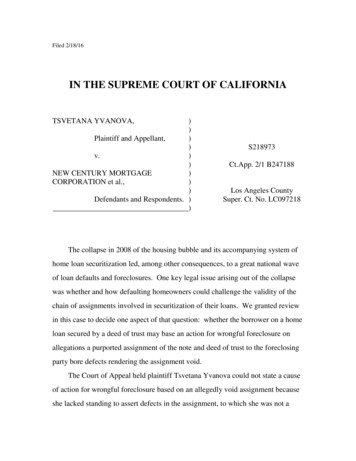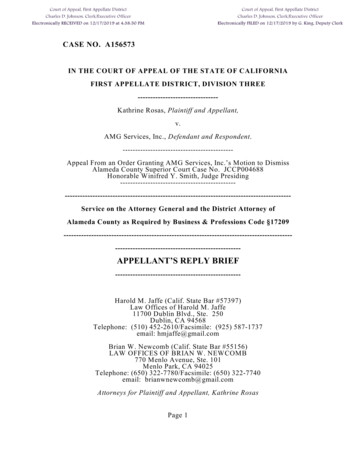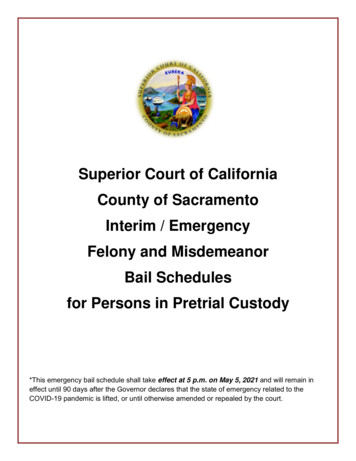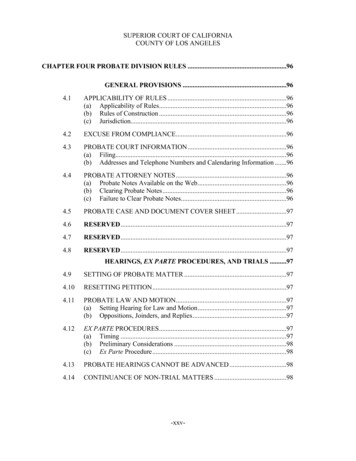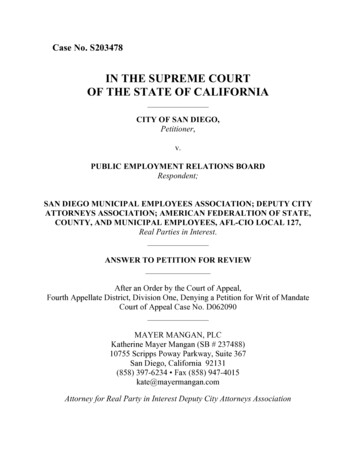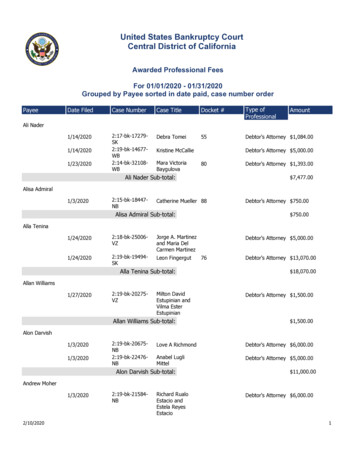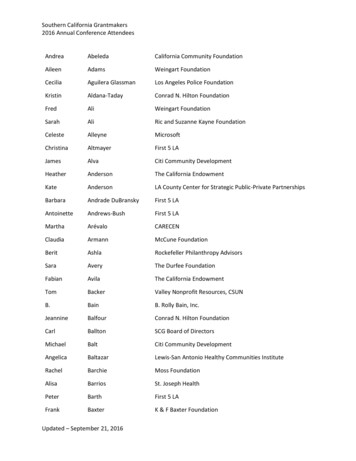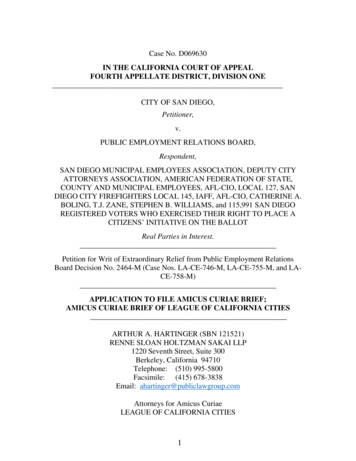
Transcription
Case No. D069630IN THE CALIFORNIA COURT OF APPEALFOURTH APPELLATE DISTRICT, DIVISION ONECITY OF SAN DIEGO,Petitioner,v.PUBLIC EMPLOYMENT RELATIONS BOARD,Respondent,SAN DIEGO MUNICIPAL EMPLOYEES ASSOCIATION, DEPUTY CITYATTORNEYS ASSOCIATION, AMERICAN FEDERATION OF STATE,COUNTY AND MUNICIPAL EMPLOYEES, AFL-CIO, LOCAL 127, SANDIEGO CITY FIREFIGHTERS LOCAL 145, IAFF, AFL-CIO, CATHERINE A.BOLING, T.J. ZANE, STEPHEN B. WILLIAMS, and 115,991 SAN DIEGOREGISTERED VOTERS WHO EXERCISED THEIR RIGHT TO PLACE ACITIZENS’ INITIATIVE ON THE BALLOTReal Parties in Interest.Petition for Writ of Extraordinary Relief from Public Employment RelationsBoard Decision No. 2464-M (Case Nos. LA-CE-746-M, LA-CE-755-M, and LACE-758-M)APPLICATION TO FILE AMICUS CURIAE BRIEF;AMICUS CURIAE BRIEF OF LEAGUE OF CALIFORNIA CITIESARTHUR A. HARTINGER (SBN 121521)RENNE SLOAN HOLTZMAN SAKAI LLP1220 Seventh Street, Suite 300Berkeley, California 94710Telephone: (510) 995-5800Facsimile: (415) 678-3838Email: ahartinger@publiclawgroup.comAttorneys for Amicus CuriaeLEAGUE OF CALIFORNIA CITIES1
TABLE OF CONTENTSI.INTRODUCTION .8II.UNDISPUTED FACTS .9III.THE MAYOR’S INVOLVEMENT .10IV.ARGUMENT .11PERB’S DECISION FAILS TO RECOGNIZE THE FREESPEECH RIGHTS OF ELECTED OFFICIALS .11THE EVIDENCE THAT MAYOR SANDERS ENGAGEDIN IMPERMISSIBLE CONDUCT IS FLIMSY ANDINSUFFICIENT, AND CANNOT BE ATTRIBUTED TO“THE CITY” IN ANY EVENT .13PERB’S RULING WOULD PLACEUNCONSTITUTIONAL OBSTACLES TO ELECTEDOFFICIALS’ FREEDOM OF EXPRESSION .16THE COURT MUST CAREFULLY SCRUTINIZE PERB’SANALYSIS OF KEY MUNICIPAL LAW PRINCIPLES, ASWELL AS THE BASIC FUNCTIONS OF LOCALGOVERNMENT .17V.CONCLUSION .183
TABLE OF AUTHORITIESPage(s)CasesBond v. Floyd,385 U.S. 116 (1966). 12Burchett v. City of Newport Beach,33 Cal. App. 4th 1472 (1995) . 15City of Pasadena v. Estrin,212 Cal. 231 (1931) . 15City of St. Louis v. Praprotnik,485 U.S. 112 (1988). 15DeGrassi v. City of Glendora,207 F.3d 636 (9th Cir. 2000) . 12Katsura v. City of San Buenaventura,155 Cal. App. 4th 104 (2007) . 15League of Women Voters v. Countywide Crim. JusticeCoordination Com.,203 Cal. App. 3d 529 (1988) . 12People v. Battin,77 Cal. App. 3d 635 (1978) . 14Stanson v. Mott,17 Cal. 3d 206 (1976) . 13, 14Vargas v. City of Salinas,46 Cal. 4th 1 (2009) . 13Wood v. Georgia,370 U.S. 375 (1962). 11StatutesCalifornia Constitution .94
Government Code section 8314(a)-(b) . 14Penal Code section 424 . 145
APPLICATION FOR LEAVE TO FILE AMICUS BRIEFTO THE HONORABLE PRESIDING JUSTICE:Pursuant to California Rules of Court, rule 8.200(c), amicus curiae Leagueof California Cities (“League”) respectfully requests permission to file theattached brief in support of Petitioner City of San Diego. This application istimely made within 14 days after the filing of the reply brief on the merits.THE INTEREST OF AMICUS CURIAEThe League is a non-profit association of 475 California cities dedicated toprotecting and restoring local control to provide for the public health, safety, andwelfare of their residents, and to enhance the quality of life for all Californians.The League is advised by its Legal Advocacy Committee, which is comprised of24 city attorneys from all regions of the State. The Committee monitors litigationof concern to municipalities, and identifies those cases that are of statewide – ornationwide – significance.The Committee has identified this case as having such significance forCalifornia cities because of the potential chilling effect on the free speech rights ofelected officials.THE NEED FOR FURTHER BRIEFINGThe underlying decision by the Public Employment Relations Board(“PERB”) would create a very harmful precedent for the League’s constituentcities. The decision implicates the important Constitutional right of electedofficials to speak out, without undue constraint, on matters of public concern.Whether the Meyers-Milias-Brown Act (“MMBA”) somehow trumps thisConstitutional right presents another important issue which deserves careful6
scrutiny by an appellate court. This will be the first opportunity for such scrutiny.The League is hopeful that the Court will benefit from its broader Statewideperspective.ABSENCE OF PARTY ASSISTANCEPursuant to California Rules of Court, rule 8.200(c)(3), the Leagueconfirms that no party or their counsel authored this brief in whole or in part. 1 Nordid any party, their counsel, person, or entity make a monetary contribution to thepreparation or submission of this brief.CONCLUSIONThe League respectfully requests that the Court grant this application forleave to file an amicus curiae brief.Dated: August 22, 2016Respectfully submitted,RENNE SLOAN HOLTZMAN SAKAI LLPBy: /s/ Arthur A. HartingerArthur A. HartingerAttorneys for Amicus CuriaeLeague of California Cities1The undersigned was selected as the League’s brief-writer while working at hispredecessor firm – Meyers Nave. The undersigned’s current partner, Tim Yeung,performed a small amount of work in the underlying PERB matter. Mr. Yeungdoes not represent the Petitioner in the Court of Appeal, and he did not participatein drafting this brief.7
AMICUS CURIAE BRIEFI.INTRODUCTIONThe underlying PERB decision would set a very dangerous precedent and itmust be vacated. It would severely limit the Constitutional right of electedofficials to support or oppose legislative proposals, or even comment publiclyabout them. And, it ignores fundamental rules of government – for example, theprinciple that a City Charter determines and defines the respective roles of cityofficials and, in this case, the Mayor of San Diego has no power under the CityCharter to adopt labor contracts or to set labor policy.The League is committed to the principle of bargaining in good faith overwages, hours and other terms and conditions of employment under the MeyersMilias-Brown Act (“MMBA”). But that is not what this case is about. This caseis about the right of public officials to express their views regarding citizens’initiatives.The elected Mayor of San Diego is not the City of San Diego. He does notsurrender his Constitutional right to support or oppose legislation simply by virtueof the MMBA. As Mayor, he is perfectly free to speak in support of pensionreform, or any other initiative. He has the Constitutional right to speak out onmatters of public concern.PERB ignored this core Constitutional right, and relied on shaky andunsupported evidence (much of it hearsay and circumstantial) to find that theMayor acted as an “agent” of the City, such that meet and confer obligations underthe MMBA were triggered. The decision was wrongly decided and it must bevacated.8
II.UNDISPUTED FACTSWhile the record is voluminous, there are certain key facts and principlesthat are completely undisputed and which bear emphasis. San Diego is a CharterCity, which enjoys plenary authority over compensation paid to its employees.(Cal. Const., Art. XI, § 5.) The Charter is the over-arching governing document inthe City. The voters closely control the Charter and act as the “legislative branch”with respect to Charter changes.Under the Charter, the City Council is the legislative body of the City,responsible for enacting resolutions and ordinances, and for making public policydecisions, including decisions about compensating City employees. The Mayorhas executive authority. He serves as the City’s chief executive officer, and chiefbudget and administrative officer.With respect to negotiating labor agreements, under the Charter it is therole of the City Council, and not the Mayor, to approve memoranda ofunderstanding (“MOUs”). Approving a MOU is a legislative act, requiring amajority vote of a quorum of Councilmembers at a properly agendized publicmeeting. Only the City Council can approve a MOU, and the Council can only“act” by a majority vote. The Mayor has no authority to adopt MOUs. He has noauthority to set policy; he is only empowered to take action to implement policiesduly enacted by the City Council.The actions at issue here do not involve any official act by either the Mayoror the Council. Rather, the actions stem from a citizens’ initiative placed on theballot by virtue of Article 2 of the California Constitution. Private citizens filedthe text of the measure (known as “Proposition B”) with the City Clerk. Allprovisions of the California Elections Code were followed, and Proposition B9
qualified for the ballot. Proposition B passed by a wide margin of voters, and theresults were duly certified by the Secretary of State.There is no evidence that the Charter authorized body to set San Diegolabor relations policy – the City Council – took any action with respect toProposition B. There is no evidence that the City Council, who again can onlytake action by majority vote, acted to endorse, disapprove or do anything withrespect to Measure B.Against this backdrop, PERB’s Administrative Law Judge accepted thelabor unions’ proffer of every scintilla of possible “evidence” – hearsay,circumstantial and opinion – to show that the Mayor of San Diego was acting asan “agent” of the City, and therefore, the City was bound to negotiate with itslabor unions before Proposition B could have been placed on the ballot. Thedecision was cavalier, and does not show proper deference to fundamentalConstitutional rights, much less the Charter mandated roles of the Mayor versusthe City Council. And PERB’s later affirmance of the ALJ’s decision revealsconfusion over key local government principles, even as to what constitutes a“municipal affair” and what the “Strong Mayor” form of government means.III.THE MAYOR’S INVOLVEMENTGiven the size of the underlying record, and the focused attack on MayorSanders, one would think there would be a mountain of evidence of abuse,sufficient to compel a labor tribunal to justify its decision to attempt to thwart thecertified results of a lawful election in a Charter city. But in the end, the evidenceis shockingly thin. In sum: The Mayor advocated for pension reform, and said it was necessary for “theCity’s financial well being.” He appeared at press conferences and otherpublic events in support of pension reform and Proposition B in particular.10
The Mayor discussed the need for pension reform with his staff. TheMayor even mentioned the issue during his State of the City address. AsPERB emphasized, only the Mayor can address the City Council during thisaddress.After evidentiary hearings where testimony and hundreds of pages of exhibitswere received, this sums up the evidence in this case of what Mayors Sanders didthat PERB found inimical to the MMBA.PERB found that Mayor Sanders crossed the line in advocatingpension reform, but it is PERB that crossed the line here.IV.ARGUMENTPERB’S DECISION FAILS TO RECOGNIZE THE FREESPEECH RIGHTS OF ELECTED OFFICIALSThis case directly implicates the core principle that public officials have aconstitutional right to express their political views, regardless of whether affectedlabor unions agree. This principle has been confirmed, time and time again, innumerous cases in both federal and state courts.In a seminal decision, the United States Supreme Court held in Wood v.Georgia, 370 U.S. 375, 394 (1962), that “the role that elected officials play in oursociety makes it all the more imperative that they be allowed freely to expressthemselves on matters of current public importance.” In Wood, an elected sheriffwas indicted for contempt of court because he made public statements expressinghis personal ideas on a voting controversy. Id. at 376. The government arguedthat the elected official’s “right to freedom of expression must be more severelycurtailed than that of an average citizen.” Id. at 393. The Supreme Court firmlyrejected this argument, holding that “the petitioner was an elected official and hadthe right to enter the field of political controversy, particularly where his politicallife was at stake.” Id. at 396.11
The United States Supreme Court used the strongest language to describethe importance of an elected official’s First Amendment rights in Bond v. Floyd,385 U.S. 116, 135-36 (1966), when it held that “the manifest function of the FirstAmendment in a representative government requires that legislators be given thewidest latitude to express their views on issues of policy” and that “the centralcommitment of the first Amendment is that ‘debate on public issues should beuninhibited, robust, and wide-open.’” (internal citations omitted). In Bond, theclerk of the Georgia House of Representatives refused to administer the oath ofoffice to a newly elected representative, on the basis that the elected representativemade public statements criticizing the government. Id. at 118. The State arguedthat the policy of encouraging free debate about government operations onlyapplied to private citizens. Id. at 136. The Supreme Court rejected this idea,holding that “legislators have an obligation to take positions on controversialpolitical questions so that their constituents can be fully informed by them, and bebetter able to assess their qualifications for office; also so they may be representedin governmental debates by the person they have elected to represent them.” Id. at136-37.Similarly, the Ninth Circuit has further emphasized that “while the freespeech rights of elected officials may well be entitled to broader protection thanthose of public employees generally, the underlying rationale remains the same.Legislators are given ‘the widest latitude to express their views on issues ofpolicy.’” DeGrassi v. City of Glendora, 207 F.3d 636, 647 (9th Cir. 2000) (citingBond v. Floyd, supra, 385 U.S. at 136).Finally, the California Court of Appeal in League of Women Voters v.Countywide Crim. Justice Coordination Com., 203 Cal. App. 3d 529, 555-56(1988) similarly held that elected officials, as individuals, have the right toadvocate qualification and passage of ballot initiatives.12
THE EVIDENCE THAT MAYOR SANDERS ENGAGED INIMPERMISSIBLE CONDUCT IS FLIMSY ANDINSUFFICIENT, AND CANNOT BE ATTRIBUTED TO “THECITY” IN ANY EVENTThe League acknowledges the various limitations on the use of publicfunds to promote partisan campaign positions. See, e.g., Stanson v. Mott, 17 Cal.3d 206 (1976) (“a public agency may not expend public funds to promote apartisan position in an election campaign.”); Vargas v. City of Salinas, 46 Cal. 4th1 (2009) (applying the rule in Stanson and holding that the City’s expenditure offunds for “informational” purposes in an election was lawful).Here, PERBstruggled to cobble together a case showing that the Mayor violated theseprinciples. He supported the initiative. He discussed it with his staff members.He mentioned its importance during a State of the City address. He used hisposition as “Mayor” to his advantage when advocating for Proposition B.The principle prohibiting the unlawful expenditure of public funds tosupport a partisan election must be balanced against the Constitutional right of freespeech that elected officials continue to enjoy during office. Here, it isunquestionable that Mayor Sanders had the right to advocate in favor ofProposition B – that is his Constitutional right. Mayor Sanders was prohibitedfrom spending public funds to advocate in favor of Proposition B, but there is nocredible evidence that he crossed that line under existing election laws. He did notuse public funds to purchase “such items as bumper stickers, posters, advertising‘floats,” or television and radio ‘spots .’” See Stanson v. Mott, supra, 17 Cal.3dat 221 (“[t]he use of public funds to purchase such items as bumper stickers,advertising ‘floats,’ or television and radio ‘spots’ unquestionably constitutesimproper campaign activity ”) (internal citations omitted); Vargas v. City ofSalinas, supra, 46 Cal. 4th at 24. His actions constituted pure free speech, and anypublic “resource” use, such as the use of a microphone during a City address, or13
even telephone and email usage, was purely incidental and permissible undercurrent laws. See Gov. Code § 8314(a)-(b) (An elected official may not use publicresources for a campaign activity, however, “‘[c]ampaign activity’ does notinclude the incidental and minimal use of public resources, such as equipment oroffice space, for campaign purposes, including the referral of unsolicited politicalmail, telephone calls, and visitors to private political entities.”).It is noteworthy that PERB did not even attempt to analyze whether MayorSanders’ actions crossed the line from permissible to impermissible campaignactivity under the relevant precedents flowing from Stanson v. Matt. Instead,PERB applied common law agency principles to conclude that the Mayor wasacting as an “agent” of the City, and therefore, the City had to meet and conferwith affected labor unions upon request. PERB’s focus on common law agencyprinciples highlights the error in its overall analysis. Common law agencyprinciples are often misapplied in the context of municipal law, and that isprecisely what happened here.PERB mistakenly believes that in the context of political expression, whena public official crosses the line and advocates inappropriately by using publicresources in a partisan election, this means the official was acting as an “agent” ofthe city and therefore the city must suffer the consequences. This is flatlyincorrect. When a public official misuses public resources, the public officialsuffers the consequences as an individual. See, e.g., People v. Battin, 77 Cal. App.3d 635 (1978) (county supervisor’s diversion of county staff time for improperpolitical purposes constituted criminal misuse of public monies under Penal Codesection 424). Contrary to PERB’s apparent assumption, a public official’smisconduct in this arena does not make the official an “agent” of the entity – infact, just the opposite. This whole foray by PERB into common law principles to14
show that Mayor Sanders acted as an agent of the City by engaging in politicalactivity is erroneous and misguided.There are additional examples why common law “agency” principles do notapply in this context. In the context of public contracting, for example, personsdealing with a municipality are charged with knowledge of the limitation ofauthority of its officers and agents, and contracts made without authority areinvalid. City of Pasadena v. Estrin, 212 Cal. 231
san diego municipal employees association, deputy city attorneys association, american federation of state, county and municipal employees, afl-cio, local 127, san diego city firefighters local 145, iaff, afl-cio, catherine a. boling, t.j. zane, stephen b. williams, and 115,991 san diego
